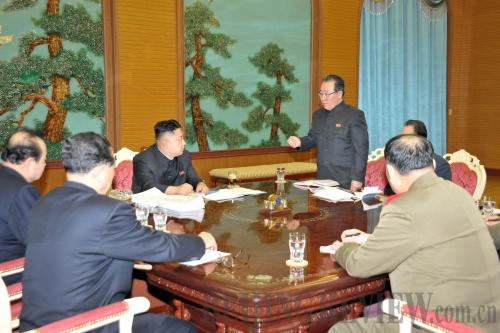|
 |
|
GAUGING THE SITUATION: North Korean leader Kim Jong Un (third left) holds a discussion with security and foreign affairs officials in Pyongyang in January (XINHUA/KCNA) |
The situation on the Korean Peninsula reached a new crossroads in January with the passage of the UN Security Council Resolution 2087. Although more symbolic than substantive, it nevertheless tightened the screws on North Korea. Pyongyang responded with a strongly worded statement vowing to conduct more rocket launches and hinting at a higher-level nuclear test.
Lacking political will
The power transition in North Korea has been largely completed, with Kim Jong Un well established as the country's new leader. The young man, who was born in the early 1980s, has made a difference since taking over the reins from his late father in December 2011. Notably, he has gained authority with the introduction of remarkable changes such as demonstrating an "everyman" persona, increasing government transparency and reshuffling the country's leadership. The Kim Jong Un administration, now budding with confidence, is set to assert itself.
In Pyongyang's view, nuclear missile capability is essential for making North Korea a powerful country. A self-defense system backed by nuclear weapons is a pivotal principle enshrined in the North Korean Constitution. At the end of 2011, the country claimed that it was speeding up the development of an experimental light water reactor and the production of low enriched uranium. It currently harbors ambitions to make further progress by improving missile delivery systems and acquire key technology for making warheads small enough to fit onto missiles. It should be noted, however, that North Korea used to pursue nuclear weapons with an eye to contending with the United States. Trying to obtain enough bargaining chips, Pyongyang aims to ease bilateral tensions with Washington and strive for its assistance so that it can develop in a secure environment.
A new nuclear test by North Korea will make denuclearization on the Korean Peninsula more elusive. The goal was reaffirmed in the September 19, 2005 Joint Statement issued at the fourth round of the six-party talks, in which North Korea committed to abandoning all nuclear weapons and existing nuclear programs and returning to the Nuclear Non-Proliferation Treaty and the safeguards of the International Atomic Energy Agency.
The statement also specified the obligations of different parties to help improve living conditions in North Korea, including offering energy assistance. The statement is now a dead letter given the parties' failure to honor the principle of "commitment for commitment, action for action." As a result, the situation on the Korean Peninsula has entered a negative feedback loop. The repeated setbacks are, to a large extent, attributable to a lack of political will.
It is unfair to place the blame solely on Pyongyang. Other factors that have complicated matters include the hard-line policy of South Korea's outgoing President Lee Myung Bak, the U.S. military's distrust, the Barack Obama administration's aggressive rebalancing in the Asia-Pacific region, Japan's right-wing politics and the stalemate over North Korea's alleged kidnapping of Japanese citizens.
South Korean President-elect Park Geun Hye has signaled a thaw in Seoul-Pyongyang relations. But it remains to be seen how courageous she will be in revising her predecessor's policy and whether she will transcend the anti-Pyongyang sentiments gaining ground in South Korea.
As Obama begins his second term in office, the United States stands ready to reexamine its policy toward North Korea. Over the past months, especially since the February 29, 2012 agreement under which North Korea agreed to suspend nuclear activities and long-range missile tests in exchange for food aid from the United States hit a snag, calls have prevailed for Washington to resist Pyongyang's "nuclear missile blackmail" and adopt a preemptive stance. There is a firm belief that Washington should restart talks with Pyongyang only when it takes substantial measures to achieve verifiable denuclearization.
| 